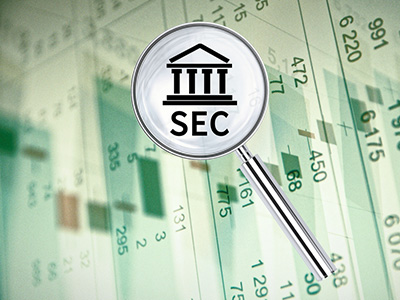The issuance of digital tokens in exchange for services rather than money still can constitute an offering of securities, according to findings recently made by the Securities and Exchange Commission in a settled enforcement action, In the Matter of Tomahawk Exploration LLC and David Thompson Laurance, Securities Act Rel. No. 33-10530, Exchange Act Rel. No. 34-83839, Admin. Proc. File No. 3-18641 (Aug. 14, 2018). Tomahawk Exploration LLC offered and distributed digital assets in the form of tokens called “Tomahawkcoins,” or “TOM tokens” through an initial coin offering (“ICO”). The company offered a “Bounty Program,” whereby Tomahawk dedicated 200,000 TOM tokens to pay third parties, offering between 10 and 4,000 TOM tokens in exchange for the following activities:
- marketing efforts;
- making requests to list TOM tokens on token trading platforms;
- promoting TOM tokens on blogs and online forums such as Twitter or Facebook;
- creating professional picture file designs;
- YouTube videos, other promotional materials; and
- online promotional efforts that targeted potential investors and directed them to Tomahawk’s offering materials.
According to the SEC’s Cease-and-Desist Order, between July and September 2017, Tomahawk issued more than 80,000 TOM tokens as bounties to approximately forty wallet holders on Tomahawk’s decentralized platform in exchange for the activities listed above. The decentralized platform on which Tomahawk issued the TOM tokens was publicly accessible to U.S. persons and others throughout the offering period.
Based on the specific facts and circumstances outlined above, the SEC reasoned that the TOM tokens were considered securities because they were investment contracts under SEC v. W.J. Howey Co., 328 U.S. 293 (1946), and its progeny, including the cases discussed by the SEC in its Report Of Investigation Pursuant To Section 21(a) Of The Securities Exchange Act Of 1934: The DAO (Exchange Act Rel. No. 81207) (July 25, 2017). The SEC applied the Howey test and stated that “[t]he TOM tokens were offered in exchange for the investment of money or other contributions of value” and that “[t]he representations in the online offering materials created an expectation of profits derived from the efforts of others, namely from the oil exploration and production operations conducted by Tomahawk and Laurance and from the opportunity to trade TOM tokens on a secondary trading platform.” In addition, the Tomahawkcoins also represented a transferable share or option on an equity share of Tomahawk Exploration LLC, which would be considered securities under the federal securities laws under Section 2(a)(1) of the Securities Act of 1933 (the “Securities Act”) and Sections 3(a)(10) and 3(a)(11) of the Securities Exchange Act of 1934 (the “Exchange Act”). The SEC also determined that the TOM tokens were equity securities because they were “penny stocks” under Section 3(a)(51) of the Exchange Act and Rule 3a51-1 thereunder.
Of particular note is the SEC Staff’s argument that the TOM tokens issued under the Bounty Program constituted an offer and sale of securities because the respondents provided TOM tokens to investors in exchange for investors’ services designed to advance the company’s economic interests and foster a trading market for its securities. Paragraphs 33 and 34 of the Order explained that distributing TOM tokens in exchange for the provision of services could still be deemed an offer of securities under Section 2(a)(3) of the Securities Act because it involved “an attempt or offer to dispose of, or solicitation of an offer to buy, a security or interest in a security, for value.” The SEC found that notwithstanding “[t]he lack of monetary consideration for purportedly ‘free’ shares,” the issuance of the TOM tokens as a “gift” of a security through the Bounty Program constituted a “sale” or “offer to sell” within the meaning of the Securities Act as stated in SEC v. Sierra Brokerage Servs., Inc., 608 F. Supp. 2d 923, 940–43 (S.D. Ohio 2009), aff’d, 712 F.3d 321 (6th Cir. 2013).
Consequently, the SEC found that the Respondents violated the securities registration provisions, Sections 5(a) and 5(c) of the Securities Act, prohibiting the selling or offering of a security through any means or instrument of transportation and communication in interstate commerce or the mails without an effective registration statement or qualifying exemption. The SEC also found violations of the antifraud provisions, Section 10(b) of the Exchange Act and Rule 10b-5(b) promulgated thereunder, arising from materially false and misleading statements found on Tomahawk’s ICO website and in its white paper.
Tomahawk is a new application of the principle that the issuance of “free” securities for some economic benefit would still constitute a sale of, or an offer to sell, securities. The SEC previously applied this principle in 1999, when SEC Staff issued at least three No-Action Letters indicating its view that Internet stock giveaways would constitute unlawful “sales” of securities if not subject to a registration statement or a valid exemption from registration:
- In the Vanderkam & Sanders No-Action Letter, SEC No-Action Letter 1999 WL 38281 (Jan. 27, 1999), the SEC Staff opined that “the issuance of securities in consideration of a person’s registration on or visit to an issuer’s Internet site would be an event of sale.” According to the Letter, such an issuance would violate Section 5 of the Securities Act unless it was the subject of a registration statement or a valid exemption from registration.
- In the Simplystocks.com No-Action Letter, SEC No-Action Letter, 1999 WL 51836 (Feb. 4, 1999), Simplystocks proposed to distribute free stocks randomly to members of a pool of entrants who logged in to Simplystocks’ website and provided their name, address, social security number, phone number and email address and chose a login name and password. Visitors would receive one entry into the stock pool for each day they logged in to the Simplystocks website. The SEC Staff were of the opinion that the Simplystocks.com stock giveaway would be an event of sale within the meaning of Section 2(a)(3) of the Securities Act and must be the subject of a registration statement or a valid exemption from registration.
- In the Andrew Jones and James Rutten No-Action Letter, SEC No-Action Letter, 1999 WL 377873 (Jun. 8, 1999), the SEC Staff opined that the issuance of three free shares of common stock to the first one million people who register with the issuer to receive the shares, whether or not through the issuer’s Internet site, and the issuance of one additional share (up to a specified maximum) to each shareholder who referred others who also become a shareholder, was an event of sale within Section 2(a)(3) of the Securities Act. The Staff opined that such an issuance would be unlawful under Section 5 of the Securities Act unless registered or exempt from registration.
Tomahawk additionally highlights the potential issues for “air drops” and the “free” distribution of tokens to recipients, as well as a further consideration to the “investment of money” prong under the Howey analysis. Moreover, the fraudulent statements found in the ICO website and white paper further drives home the point that any and all documentation intended to be disseminated, whether in the public or private spheres, should be carefully reviewed and vetted by counsel. As with all matters in the blockchain and crypto-space, all facts and circumstances related to the distribution of digital assets must be carefully considered prior to and when conducting any type of distribution or sale to recipients and users.





